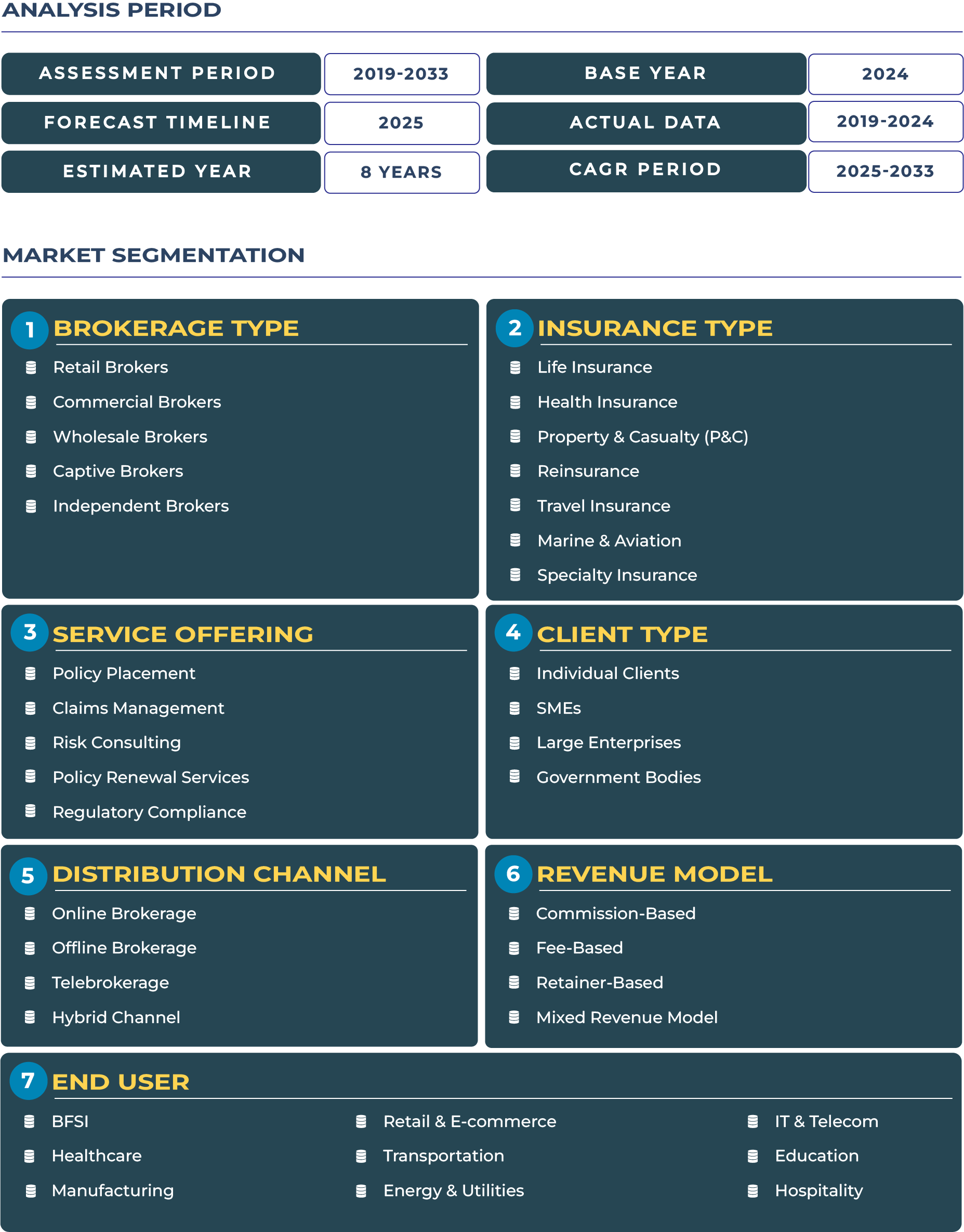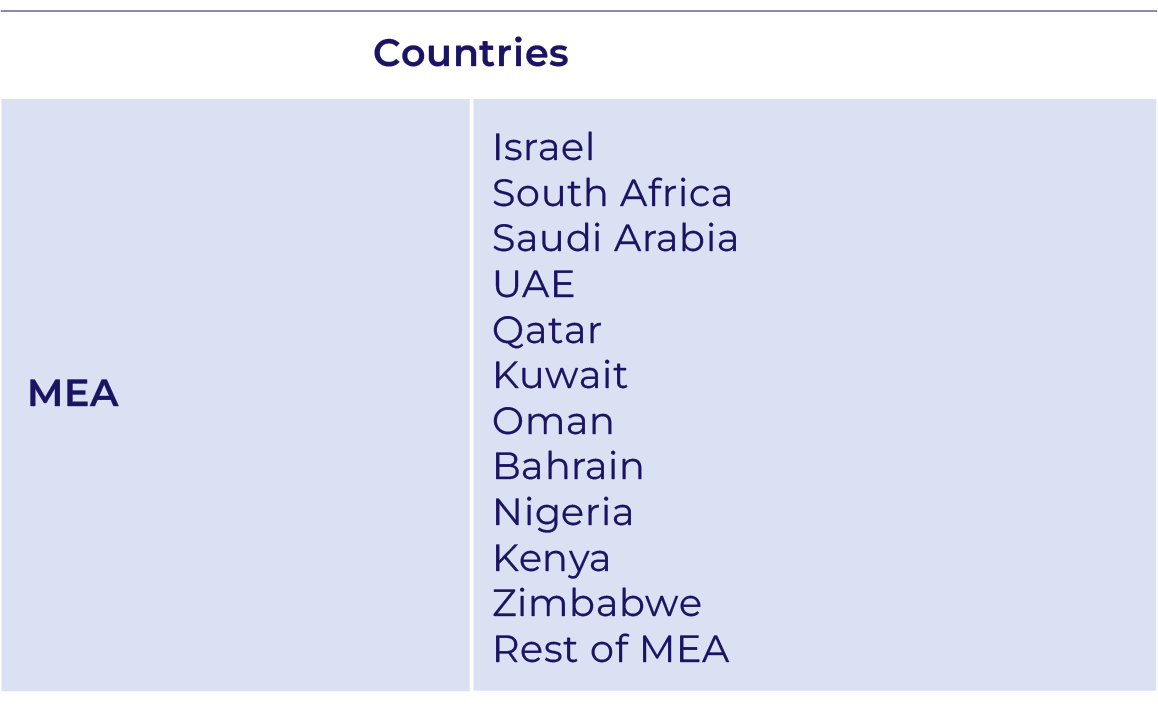Specialized Health & Islamic Insurance Brokerage: How MEA Brokers Are Shaping a Young Demographic Future
The Middle East and Africa (MEA) insurance brokerage market is undergoing rapid transformation, fueled by a younger population, rising healthcare expenditure, and increasing demand for sector-specialized products. Brokers in the region are adapting by aligning services with evolving needs, particularly through private health coverage, Takaful insurance, and small and medium-sized enterprise (SME) solutions. This shift is essential in a market where population growth is outpacing traditional insurance penetration. The MEA brokerage sector has established itself as a crucial intermediary, bridging gaps in access, affordability, and trust across diverse economies ranging from high-income Gulf Cooperation Council (GCC) nations to emerging African markets.
According to DataCube Research, the MEA insurance brokerage market is projected to grow from USD 11.55 billion in 2025 to USD 19.18 billion by 2033, expanding at a CAGR of 6.5% during 2025–2033. Growth is being driven by the convergence of digital brokerage ecosystems, the increasing preference for health and life insurance products, and the institutionalization of Islamic finance frameworks. These dynamics are pushing retail brokers and independent firms to focus more on specialized coverage categories rather than general-purpose offerings. The ability of brokerage firms to respond to healthcare reforms, labor market shifts, and financial inclusion policies will determine their long-term sustainability in the MEA insurance brokerage landscape.
Market Outlook: Rising Healthcare Expenditure and Takaful-Driven Brokerage Innovation in MEA
The MEA region’s insurance brokerage market reflects a strong correlation between youthful demographics and demand for health-centric insurance solutions. Countries such as Saudi Arabia, UAE, Nigeria, and Kenya are witnessing rising private healthcare expenditure as public systems face capacity constraints. Brokers are filling this gap by designing personalized products for families and SMEs, especially in urban centers where younger professionals expect digital-first engagement and affordable protection plans. Takaful insurance, which complies with Islamic finance principles, has also emerged as a major driver, particularly across the GCC and North African economies, where religiously aligned financial products carry greater consumer trust.
The regional brokerage industry is shifting towards specialized institutional brokerage models that align with consumer expectations for transparency and trust. Independent and retail brokers are increasingly embedding themselves into healthcare ecosystems, offering bundled health, life, and liability insurance via digital onboarding platforms. This model strengthens client retention and builds resilience in a market exposed to geopolitical instability and economic diversification programs. The projected growth reflects not only demographic momentum but also strategic broker realignments toward health and Islamic insurance verticals.
Drivers & Restraints: Balancing Insurance Penetration with Regulatory and Commission-Based Challenges
Health and Liability Insurance Demand Accelerating Brokerage Expansion
One of the strongest growth drivers in the MEA insurance brokerage sector is the rising demand for health and liability insurance. The World Health Organization (WHO) reported in 2023 that healthcare expenditure per capita in the GCC has grown by over 7% annually, driven by private sector participation. Brokers are capitalizing on this by expanding SME-targeted products, professional liability coverage, and cyber-risk policies. Commercial brokers in markets like UAE and South Africa are also seeing increased uptake of group policies as multinational corporations expand their workforce across the region. This rising insurance penetration, particularly in middle-income economies, is establishing brokers as key mediators in risk management strategies.
Regulatory Complexity and Commission-Dependency Limiting Broker Growth
Despite robust demand, growth in the MEA insurance brokerage landscape is constrained by regulatory inconsistency and high dependency on commission-based revenues. Countries such as Nigeria and Kenya face fragmented oversight, leading to inconsistencies in brokerage operations. Moreover, many retail and independent brokers remain overly reliant on commissions from insurers, which limits their ability to diversify revenue streams through advisory and technology-enabled services. Mis-selling risks have further dented consumer trust in some African markets, leading to tighter scrutiny from national insurance regulators. This creates a structural barrier to scalability, particularly for smaller brokers lacking capital reserves to invest in compliance and technology infrastructure.
Trends & Opportunities: Digital Onboarding, Blockchain Integration, and SME Insurance Solutions
Digital Onboarding and Blockchain Transforming Broker-Client Relationships
A defining trend in the MEA insurance brokerage industry is the shift toward digital-first engagement. In the UAE, robo-broker platforms and blockchain-based verification tools are enhancing policy transparency and reducing fraud. By integrating blockchain into claims processing, wholesale brokers are enabling faster settlements and reducing disputes, thereby increasing client satisfaction. Kenya and South Africa have also embraced mobile-based onboarding, where brokers collaborate with telcos to extend micro-insurance and health coverage products to underserved populations. These digital ecosystems are allowing brokers to expand their reach while reducing operational costs and boosting compliance.
Expanding Opportunities in Student Group Policies and SME Coverage
The rising young workforce across MEA countries presents new opportunities for student group policies and SME insurance-as-a-service models. Brokers in Egypt, Nigeria, and Saudi Arabia are increasingly designing group policies for universities and early-career professionals, helping to bridge the gap between youth-driven demand and financial protection needs. SMEs, which account for over 90% of enterprises in Africa and GCC economies, remain largely uninsured or underinsured. Independent brokers are stepping in to design affordable, modular insurance solutions tailored for SMEs, including health coverage, liability protection, and digital disruption risk policies.
Government Regulation: Oversight and Shariah Compliance Standards Reshaping Brokerage Practices
The regulatory environment in MEA continues to shape the performance of the insurance brokerage ecosystem. National regulators such as the Saudi Central Bank (SAMA) and the Financial Services Authority of the UAE have introduced stricter licensing, solvency, and transparency requirements for brokers, particularly in health and Takaful segments. Regulatory harmonization is gradually emerging, especially across GCC markets, where unified insurance frameworks are being promoted to strengthen consumer trust. Shariah compliance standards, overseen by Islamic finance authorities, have also provided structured guidance for Takaful brokerage, reducing reputational risks and ensuring ethical practices in insurance distribution.
Key Impacting Factors: Demographic Momentum, Employment Shifts, and Healthcare Spending
The MEA insurance brokerage sector is heavily influenced by structural economic factors. The IMF reported in 2024 that the working-age population in Africa will increase by 1.3% annually, fueling demand for workforce-related insurance products such as group health and pension schemes. Rising healthcare expenditure per capita in GCC economies is also expanding the market for specialized health coverage, with brokers strategically positioned to design customized products. However, the high proportion of informal sector employment in African economies continues to limit insurance uptake, as brokers struggle to extend coverage in markets where financial literacy and formal employment remain low.
Regional Analysis by Country
- Saudi Arabia: Brokers are capitalizing on Vision 2030 reforms by focusing on health and Takaful insurance, with commercial brokers dominating corporate coverage.
- UAE: Digital onboarding and robo-brokers are transforming customer acquisition, with regulatory oversight ensuring transparency.
- Qatar: Family-owned businesses are driving demand for succession planning and life insurance brokerage services.
- Kuwait: Rising expatriate population is fueling health and liability policy brokerage.
- Oman: Brokers are emphasizing SME-focused policies amid government efforts to diversify the economy.
- Bahrain: Takaful insurance products dominate broker portfolios due to strong Islamic finance influence.
- Israel: Brokers are leveraging high-tech ecosystems to expand cyber insurance coverage.
- South Africa: Brokers are driving demand for liability and auto insurance in a competitive market.
- Nigeria: Rising urban workforce is pushing demand for affordable family health coverage, despite low insurance penetration.
- Kenya: Mobile-enabled brokers are extending micro-insurance to rural populations via telco partnerships.
- Zimbabwe: Brokers are offering inflation-protected insurance solutions as economic volatility undermines consumer trust.
Competitive Landscape: Sector Specialization and Strategic Partnerships Defining Market Leadership
The MEA insurance brokerage landscape is becoming increasingly competitive, with both local and global firms expanding their footprint. In March 2024, MetLife MENA launched specialized broker certification programs in UAE and Kenya to strengthen health and Takaful distribution networks. This initiative reflects the growing trend of sector specialization as brokers focus on high-growth areas like health and Islamic insurance. Independent brokers across Africa are collaborating with fintech startups to extend digital onboarding for underserved markets. Meanwhile, wholesale brokers in GCC countries are partnering with multinational insurers to manage corporate liability risks, enhancing their role in regional risk management strategies.
Conclusion: Specialized Brokerage Models Anchoring MEA Insurance Market Growth
The MEA insurance brokerage market is entering a transformative decade, where specialization, digitalization, and demographic momentum will redefine its trajectory. With increasing demand for insurance brokers must balance consumer trust with technological integration and regulatory compliance. Specialized offerings in health insurance, Takaful solutions, and SME-targeted policies will dominate the brokerage agenda, supported by digital-first channels that enhance accessibility across diverse income segments. While regulatory inconsistency and commission dependency remain challenges, the sector is well-positioned to leverage youthful demographics and rising private healthcare expenditure as structural growth drivers.
For long-term sustainability, insurance brokers in MEA must pursue sector-focused strategies, invest in digital ecosystems, and align with regulatory frameworks that promote transparency and ethical practices. By doing so, the brokerage ecosystem can transform itself into a cornerstone of financial resilience and inclusivity, bridging gaps between insurers and a rapidly evolving consumer base across the Middle East and Africa.








